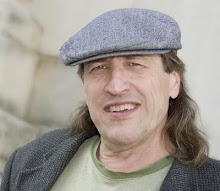August 4, 1980
The fishermen point out the place where my uncle took the
plunge. So bent on self destruction even the guard rail could not hold him back,
pushing his pale green carpenter’s van into the body of the river like a
splinter.
When the police and emts rushed into the water from behind
Service Diner to save him, he fought them off.
He did not want to be saved.
My uncle knows the shores of this river better than I ever
will, having grown up on its bangs, an early river rat, a tough teen who had to
fight his way through the Garfield gangs from Lodi to get his share.
He knows the weak places along this river, the places were a
determined man can find death in a rush, and thought he’d found his niche in a
weak piece of rail, gunning his engine across the parking lot the way he once
did ho rods along River Drive as a kid. Then, he struck wood and metal and
through, his van becoming airborne despite the accumulation of saws and drills
and lumber he had collected inside. And for a moment, when the stony bank fell
out from under the undercarriage and wheels, he flew – crash landing with a
splat on the flat surface a dozen yards upriver from the falls.
I do not know if he intended for the current to carry him
over the brink. He won’t say although he still mumbles about how his truck
betrayed him by getting stuck in the mud.
He is no fisherman like his father and brothers are – too agitated
even as a boy to watch fishing floats bob on the surface of the water until
some invisible species decides to bit. But he loved the water, coming to these
shores ache day the way I do, if not to pray then to find something he could not
find in other places, amid the piles of old docks and crumbling old paper
mills, reeds rubbing shoulders with him like old friends.
Never welcome even in the old neighborhood where each day
required him to fight for every inch of progress, he came here, stumbling over
rocks and roots, up one bank to cross the bridge to do the same on the other
bank, swimming in summer in the polluted waters of the Dundee Canal, slaking on
its surface when a deep freeze sealed it while the rest of the river continued
to rumble nearby.
Why he decided to die here, he won’t say – nor can any of
the fishermen who watched it unfold, most of them knowing him as a local
carpenter, many aware of how much he loved wood, the feel of it against his
blistered fingers, the small of it when he cut it open with a saw. He learned
the craft from his father, who built many of the houses along the Bergen County
side of the river.
I don’t love wood as much as he does, but I love this river,
the barn swallows swirling around my head, the carp and the catfish stirring
the water at my feet. I ache from climbing up and down these banks, grabbing
branches and trucks to keep my balance. This is life to me, not death. So I
struggle to make sense of why he needed to die here, why when the police
reached him he beat them off with the same two fists he needed as a boy to even
get here – tow truck pulling out his work van long after the police dragged him
to shore, he dripping this water as if blood.
The fishermen tell me this tale over and over again, as if
my uncle was the big fish they saw caught, the exaggeration growing with each
retelling, some of the tale-tellers knowing who I am, most not, all in love
with the tall tale more than they ever loved the man with me loving man and
river, and hating the idea of choosing between them, life over death, seeing this
place as a place of living, and now, as a place of dying, too.










No comments:
Post a Comment